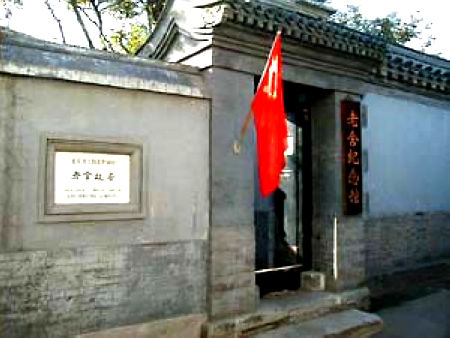A place with no memory: Xiaoyangjia Hutong
- By Yin Yeping
 0 Comment(s)
0 Comment(s) Print
Print E-mail
Global Times, February 11, 2010
E-mail
Global Times, February 11, 2010
|
|
|
Lao She Memorial Hall |
As my hutong tour continues, I find another with little evidence of its former historical value. Xiaoyangjia used to be called Yang Quan but was changed in 1949 because its originally meaning ("sheepfold," a place to feed sheep) was considered indecent for a supposedly civilized city.
Located on the eastern side of Xinjiekou East Main Road, not far from Huguo temple, it could easily be missed. Although the structure of the hutong is wide at the center, the narrow entrances at either end meant that, even though I carefully checked with my map, it still took a while to find.
No. 8: birth of a writer
But the uniqueness of this hutong is less its shape than its close connection with one of the most famous of Chinese writers, Lao She. It was here that the author of classics like Four Generations Under One Roof was born in 1899 and raised, a place he cherished so much he made it the setting of this book as well as A Statement of a Little Feature and Beneath the Red Banner. It could be said that his upbringing here is where the core materials and spiritual ideas of his work came from.
Lao's childhood coincided with one of the hardest times in modern Chinese history, between the failure of the Wu Xu reformation and invasion from abroad, when China's fate seemed constantly on the brink. His father died fighting the Eight-Power Allied armies during their invasion of Beijing, as Emperor Guang Xu fled the city leaving just a few Imperial soldier fighting street battles against overwhelming odds. As he was dying, he managed to send word home to his family of his fate. Lao was just one and half years old but that was to be the last he would hear of his father.
Like many families during the occupation, No. 8 was "visited" by soldiers, but Lao escaped unharmed by being hidden under a suitcase. Such experiences would inform his life's work: "During my childhood… the foreign devils my mother told me about were more barbaric and cruel than any fairy tale ogre. And fairy tales are only fairy tales… my mother's stories directly affected our whole family," he later recalled.
A hard-knock life
With no man at home, the financial burden fell to Lao's mother and older sister, who had to work as dress washers to feed the family. These early years of hardship are described in Four Generations Under One Roof, which describes the up and downs of a traditional Chinese family life in a hutong under the Japanese Occupation.
In it, Lao discusses the old Yang Quan name: "Probably this was really a place of sheepfold, as it's a regular, slightly crooked straight city hutong, it's more like a gourd with its mouth towards the main street too small and narrow to even notice." His description of the fictional hutong is much like what I witnessed here and now, but the yard was bigger before the privates houses started to be built, according to a local resident. I tried looking for jujube trees he describes as filling the yard with their blossoms' sweet fragrance during summer but to no avail.

Go to Forum >>0 Comment(s)